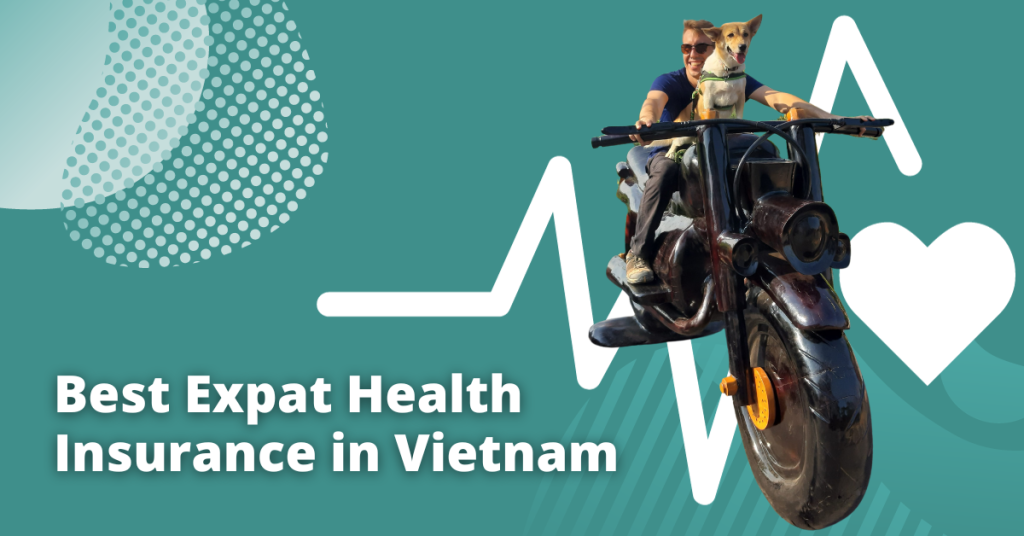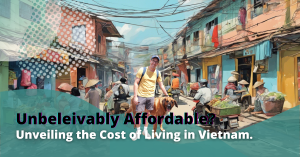Introduction to Expat Health Insurance in Vietnam
Moving to a new country will always be an exciting adventure. Unfortunately, the adventure could come to an abrupt end if you fail to learn about, understand and manage the risks that you may encounter. One of these risks is physical harm caused by injury or illness and the best way to manage physical risk is through transference.
Transference is the risk management technique used to transfer any potential loss from a known risk to a third party. For most foreigners, buying expat health insurance is the best way to mitigate any potential large loss that might come about from physical injury or illness.
This article not only explores the importance of health insurance for expats in Vietnam but also names a few of the best expat health insurance providers which may help you make a decision when looking for options.
Importance of Health Insurance for Expats in Vietnam
While Vietnam has a rapidly growing healthcare system and improved infrastructure, the quality and accessibility of really good medical services vary greatly. Unsurprisingly, you may struggle to find hospitals where you can communicate with Doctors and Nurses in English and, in hospitals where English is spoken, you might find treatment unaffordable.
Expat health insurance therefore ensures that you’re able to get the best quality care you can get when needed, in addition to acting as a financial security blanket by protecting your financial stability and health from major unforeseen costs.
Furthermore, health insurance is important for peace of mind. For dependents and loved ones, knowing that money won’t restrict your access to the best medical care is often of great importance, and it should be for you too. This is because all good expat health insurance also covers emergency evacuation, repatriation of mortal remains and funeral costs should the worst happen. The last thing you should want is for your family and friends to have to pay for your repatriation and funeral. Right?
Health insurance is the ultimate financial planning tool and needs to be considered when navigating your personal finances in Vietnam.
Obviously, private health insurance covers much more than just evacuation. However, it can be hard to know exactly what is covered.
What does international private medical insurance cover?
Most foreigners know that expat health insurance, also known as international private medical insurance (IPMI), can cover medical expenses such as general Doctor visits and consultations, inpatient hospitalisation and surgery. However, it may be surprising to some to know that health insurance can also cover everything from physiotherapy to psychiatrist appointments, routine health checks, cancer screening, and dental cleaning.
Outside of the standard medical coverage, expat health insurance may also cover:
- Vision
- Dental and oral treatment
- Psychologists and psychiatric treatment
- Diagnostic scans (MRI, PET, CT, X-ray etc)
- Prescribed medicine
- Maternity
- Palliative care
- Physiotherapy and chiropractic treatment
- Chinese medicine
- Routine health checks and cancer screening
The coverage that you end up getting with your health insurance in Vietnam is also determined by the policy you purchase. If you are on a budget you are likely to buy an Inpatient only plan, while if you want more comprehensive coverage your expat health insurance will likely also include Outpatient benefits.
What is the difference between Inpatient and Outpatient health insurance?
Inpatient and Outpatient can be seen as two separate layers of an expat health insurance policy. Depending on how much money you spend and how extensive you want your coverage to be, will often influence if you just buy inpatient-only insurance or also include outpatient. Every insurance policy includes inpatient coverage as a bare minimum, although this does sometimes differ slightly between providers.
Inpatient Benefits
Inpatient benefits, also known as emergency only or hospitalisation insurance, is the core coverage that every expat health insurance includes. Inpatient only insurance will only pay for medical costs when you are actually admitted to a hospital for something serious. This can include any illness which leads to hospitalisation or surgery. It also includes coverage for medical bills induced when you are admitted to a hospital bed simply for observation, as long as it is medically necessary.
It is important to note that nearly all insurance providers have specifications regarding how long you have to be admitted to a hospital bed in order for medical bills to be covered. A good rule of thumb is to think that you must be admitted for 24 hours or more, but you can check your health insurance plan for their specific restrictions.
Inpatient expat health insurance also sometimes covers surgery as a day patient (not being admitted to hospital), emergency visits and outpatient diagnostic tests, such as MRIs and CT scans. Reach out to your insurance provider or broker to know the full extent of your cover.
Outpatient Benefits
Outpatient is also referred to as comprehensive coverage. In addition to covering medical costs incurred during inpatient treatment, an expat health insurance policy with outpatient benefits also covers medical costs from general practitioner visits, specialist consultations, physiotherapy and any other costs you may incur by just seeing a Doctor.
To be clear, if you have outpatient cover, you do not have to be admitted to hospital in order for medical bills to be covered by your insurance. However, the medical treatment that you receive still has to be medically necessary. This means that the health insurance will not cover treatment that isn’t referred by a medical practitioner.
What is not covered by expat health insurance?
It’s important to note that private expat health insurance does not automatically cover all medical care. Often, private insurance will not cover treatment for pre-existing conditions, maternity, dental care or vision. These benefits are often known as additional extras or add-ons, and you will have to specifically request their coverage and have it confirmed when signing up to your insurance plan. If included, they often come with waiting periods and an increase in your premiums.
Things to consider when choosing health insurance in Vietnam
When contemplating health insurance options it is essential to look for a policy that not only suits your budget and covers the medical services you need, but also includes all the small things that you may not think of. These include benefits such as emergency transportation, repatriation, deductibles or co-payments and coverage zones.
When are picking your expat health insurance plan you’re not just looking for any old coverage. You should consider this an investment into your future well-being and financial stability while also wanting to secure your access to the best medical treatment.
Having worked in the insurance industry for a long time and helping hundreds of people secure their private medical insurance I know that it can be overwhelming. But, by considering a few key benefits you can simplify the process and make a more informed decision. These are the most important factors you should consider when choosing expat health insurance:
- Coverage options: Are you just looking for emergency (inpatient-only) cover for when you are hospitalised, or do you want comprehensive cover to include normal doctor visits, physiotherapy, prescribed medicine and the like?
- Coverage zones: Most international private medical insurance providers offer coverage zones based on geographical regions. For example, your coverage zone can be just Southeast Asia, Asia, Europe or Worldwide.
- Direct billing: This refers to the list of clinics and hospitals within the insurance provider’s network. If direct billing is offered, the clinic and hospital can arrange for medical treatment to be directly billed to the insurance provider.
- Customer support and claim help: No insurance is worth the cost if they do not offer ongoing support when needed the most. Customer support after sale and claim help is as important, if not more so, than the coverage the insurance offers.
- Overall cost: Your expat health insurance needs to fit your budget, but should not be an afterthought. Allocate enough money to buy good health insurance rather than just spending the bare minimum. Cheap health insurance is not worth it.
- Policy terms and conditions: All private medical insurance providers have essentially the same T&Cs. There is a lot of fine print detailing what is not covered and this should always be reviewed.
- Reputation: Reviews from your peers is quintessential when it comes to health insurance. You wouldn’t eat at a 2-star restaurant, why would you want your health in the hands of a 2-star insurance provider?
By reviewing each of these factors you can narrow down your insurance options and choose a provider that best suits your needs and budget.
Top Picks for the Best Expat Health Insurance in Vietnam
Understanding the importance of expat health insurance in Vietnam is the first step, and the second is knowing what to consider when reviewing options. The final step is knowing which health insurance providers are available in Southeast Asia.
Below is a list of the best expat health insurance providers in Vietnam which have been separated by quality, cost and general overall rating.
The best health insurance providers in Vietnam
These health insurance providers are among the biggest in the world with the best reputation for ease, care and quality. The downsides are that with immense quality comes high premium costs, and sometimes their global reach hinders customer support. Fortunately, since the insurance is so good, you often don’t need input from any customer support.
- Allianz
- Cigna
- MSH
The best value expat health insurance in Vietnam
The best value health insurance plans are offered by smaller international providers and health insurance companies that have a regional focus. The benefit of these insurance plans are that they are cheaper than the high-end global insurers but still offer the same, if not better, customer support.
If you want great international medical insurance but don’t want to spend money on the global giants, the following insurance providers are recommended.
- Morgan Price
- April
- Luma
- Henner
- IPH (International Private Healthcare)
- ACS
All things considered, these providers offer the ultimate balance between price and coverage. From full medical benefits, global coverage zones, “Western” customer support and insurance regulations, they usually have it all. In addition, international providers have guaranteed renewals which cannot be overlooked.
Local health insurance providers in Vietnam
These insurance providers should be considered a final option for those who simply cannot afford anything else. They are budget friendly, but like anything cheap, they do come with several downsides. The major disadvantages with local health insurance providers include:
- Limited benefit limits: Every plan has a maximum claimable amount. Local plans often have very low annual limits, as well as daily visits that often won’t be sufficient to cover costs at international hospitals in Vietnam.
- Restricted coverage zones: Geographical coverage zones are usually limited to only Vietnam, or in the best case Asia. However, with wider geographical coverage zones you will likely have to pay first and then try to claim any medical costs back.
- Experience rated terms:
- Poor claim support and frequent delays:
Vietnam health insurance providers include:
- Bao Viet
- Pacific Cross
- PTI
- PVI
- PJICO
Remember that before you buy any expat health insurance you should thoroughly research the insurance providers and compare their plans. It is also highly recommended that you speak to a reputable insurance broker in your area as they will be able to provide you with multiple options for comparison as well as give detailed feedback on the reputation and regulation of each provider.
What does expat health insurance cost in Vietnam?
The cost of expat health insurance varies depending on the insurance provider, coverage limits but also the applicant. This is because the price of health insurance is determined by your age, current and previous health as well as where you live. Of course, health insurance costs can still be estimated.
The table below shows the estimated monthly cost of expat health insurance for healthy, non-smoking 35-40 year olds living in Vietnam. It also compares the premiums for the most expensive providers to the best value and local insurance options.
| Coverage | Local Provider | Best value expat health insurance providers | Global insurance providers |
|---|---|---|---|
| Inpatient only | $30-$50 | $70-90 | $120-$160 |
| Inpatient and outpatient (Comprehensive) | $60-$90 | $110-$145 | $200-$230 |
Travel Insurance vs Health Insurance: Understanding the Difference
First and foremost it is important to know that travel insurance is not the same as health insurance. These are two completely different insurance products meant for two completely different individuals. As an expat in Vietnam, you may be tempted to purchase travel insurance as it is cheaper than real health insurance. But, if you do and something bad happens, you may be left without coverage and have to cover your own medical costs.
Travel insurance
Travel insurance is designed for individuals who are travelling. It covers their medical expenses should they end up in hospital from something acute and unexpected, in addition to providing some coverage for trip cancellations, lost luggage and other travel-related complications. The biggest reasons why travel insurance is not health insurance is that you usually have to:
- Have onward travel plans including homebound flights
- Take out the insurance before you embark on your travels
- Accept that there is no coverage for any pre-existing conditions
- Include a deductible with your policy
- Refrain from participating in ‘hazardous’ sports or activities
- Understand that you may not be covered while driving a motorbike or any other vehicles
- Accept that renewal is not guaranteed
- Adhere to strict terms and conditions
Health insurance
Expat health insurance, on the other hand, is specifically designed to cater for foreigners living outside of their home countries for long periods of time. Depending on the provider and policy, real health insurance can cover pre-existing conditions, and additional extras such as maternity and dental, as well as having minimal restrictions regarding vehicle use, sports participation and renewals.
Life Insurance for Expats in Vietnam: Is it Necessary?
While health insurance needs to be the top priority for expats in Vietnam, life insurance is also worth considering if you have any loved ones or dependents that rely either in part or in full, on your salary. If the worst were to happen then the death benefit (payout) from life insurance will provide your family with a much-needed financial injection to cover any sudden expenses. These usually include:
- Funeral costs and final expenses
- Outstanding debts and personal loans
- Relocation costs to home country
- Rent
Life insurance also provides your family with a financial safety net and stability since your loved ones can use the tax-free payout from the life insurance to replace your income for the foreseeable future. Savings only last so long, and without your income your family might struggle financially to cover rent, health insurance premiums, tuition and any other number of costs associated with living as an expat in Vietnam.
When considering expat life insurance options, you want to evaluate:
- Coverage amount (aka death benefit or sum insured)
- Policy terms
- Premiums
- Portability
It is highly recommended to speak to a financial planner or insurance broker to compare multiple life insurance providers and fully understand the coverage.
How to Apply for Health Insurance as an Expat in Vietnam
Applying for expat health insurance in Vietnam is not an easy task. As you may have noticed throughout this article there are a lot of things to consider, compare and review. In addition, several insurance providers do not offer direct-to-customer sales and instead rely on insurance intermediaries such as brokers and agents to aid in client acquisition.
Insurance brokers often receive a bad reputation due to the false assumption that premiums are higher when applying through an intermediary. The fact is that health insurance premiums are always the same no matter how you end up applying for your medical coverage. The only difference when applying through a good insurance broker is that you receive reliable advice from experienced professionals, while also being able to review multiple options and prices at the same time.
The best way to find a reliable insurance broker in Vietnam and Southeast Asia is to use local expat forums and then look at the company’s Google ratings. Reputation is everything when it comes to health insurance and you don’t want an intermediary that you cannot trust.
Conclusion: Securing your Health in Vietnam
As you may have noticed by now, securing health insurance is an incredibly important step for foreigners when they move to Vietnam. By considering the importance of expat health insurance and all the factors that come into play when choosing a plan, not only do you identify any risks that you face you also make the conscious decision to mitigate their potential impact on your financial health.
Health insurance is one of the best financial planning tools in your arsenal to transfer the risk of extreme medical debt to a third party in exchange for paying smaller, known premiums. All you have to do is remember to compare multiple plans, evaluate coverage limits and zones and ensure that you stick to your budget without being cheap.
You should always take time to understand your policy’s terms, exclusions and limitations while consulting with an insurance expert if needed.
Note: This article is for informational purposes only and should not be considered as professional advice. Please consult with a qualified insurance agent or broker for personalised guidance regarding your specific situation.


